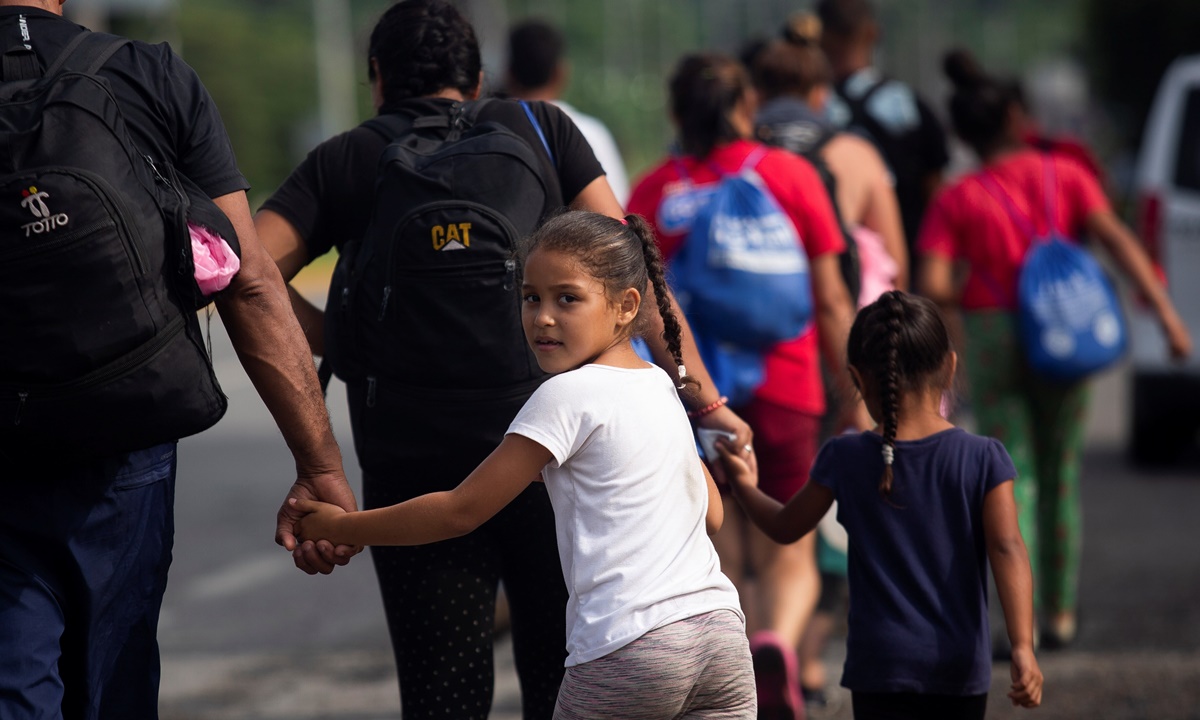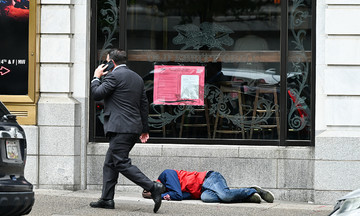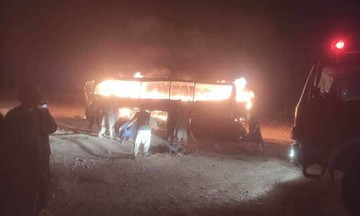Kimberly's father grew up in a small, shack-like house in Mexico, forced to work from a young age and never finishing high school. Her mother also experienced poverty.
After marrying, their experiences convinced them that Mexico couldn't offer the future their children deserved. So, 22 years ago, while pregnant with Kimberly's older sister, they made the daring journey across the border to the US.
 |
Children hold their parents' hands as a migrant caravan crosses Mexico en route to the US in 2022. Photo: Reuters |
Children hold their parents' hands as a migrant caravan crosses Mexico en route to the US in 2022. Photo: Reuters
Born in the US, Kimberly and her two sisters are American citizens, but their parents remain undocumented immigrants. For over two decades, they have lived in the shadows, working low-wage jobs like cleaning, childcare, and construction to support their family.
Kimberly says her parents are currently safe, but she fears everything could change in an instant. Life became "uncertain" and "like a nightmare," she says, when former President Donald Trump launched his crackdown on undocumented immigrants, conducting mass deportations.
This revived her lifelong fear of being separated from her parents.
"Seeing how President Trump handled the situation, I don't think our future will be okay," she said. "Now, no one thinks or sees you as a person. My parents may not be living legally in the US, but they are human beings... A piece of paper can't determine whether you're human or not."
Kimberly says she and her sisters grew up imagining US Immigration and Customs Enforcement (ICE) officers knocking on their door and taking their family away.
"As a child, whenever I was in the car with my parents, I would always look back to see if anyone was following us, because sometimes people were stopped without knowing where the police car came from," she said. "My family was always vigilant not only to drive safely but also to appear as normal as possible."
Throughout her childhood, she could sense her parents' anxieties, despite their attempts to hide them. "As a parent, you have to be strong, pretend that everything is going to be okay so your children don't worry or fret. But I could clearly see all their emotions," Kimberly said.
For years, her family sought out communities with large Mexican populations for a sense of belonging and mutual support. Kimberly's parents worked tirelessly, often returning home late at night. Their employers provided the necessary paperwork for them to file taxes, and Kimberly emphasizes that her parents always paid their taxes diligently.
When the daughters were old enough to stay home alone after school, Kimberly's mother took on two jobs.
"We'd be home for about two hours before our mother came home, then she would cook dinner and make sure we were all okay before going to her second job. During this time, my sisters and I did our homework and studied," she recounted.
"My youngest sister was around 4 or 5 years old at the time, and when she asked when our parents would be back, I couldn't give her a definite answer. All I could say was that Mom would be home soon. But she kept asking and asking, and I really couldn't give her a truthful answer. All I could do was come up with games or try to get her to sleep," Kimberly said.
Kimberly's parents considered applying for green cards, but they heard the process could take years, and they risked deportation while waiting. This was a risk they couldn't take with three young daughters.
Now, Kimberly worries that her parents might be apprehended in an immigration raid and taken to detention centers, or even deported, without any notice. She fears that, in such a scenario, it would be difficult for the sisters to contact them and ensure their safe return to Mexico.
"When I see what ICE is doing, it's exactly like the scenes I imagined as a child," she said. "My biggest fear is that my parents will feel like everything they did for us was in vain, when it really wasn't because my sisters and I have received a great education."
Kimberly says she would consider moving to Mexico to be with her parents if they were deported, though it's not what she truly wants, as she is living the "American dream" that many desire.
 |
Kimberly, whose parents are Mexican immigrants and have lived undocumented in the US for over two decades. Photo: CNN |
Kimberly, whose parents are Mexican immigrants and have lived undocumented in the US for over two decades. Photo: CNN
"When I was little, my parents thought about returning to Mexico many times. And all my sisters and I could do was cry and tell them we didn't want to go back," Kimberly recalled.
Now, a university student, she is preparing herself to take care of her parents, no matter what happens. "I'm studying chemistry and about to start an internship. I hope that at some point I can work and provide for my parents the way they raised me," she said.
"I'm truly grateful for the education and skill development I've received in the US. So even if we have to go back to Mexico, I know I'll be ready for anything, and I know how to rise up from now on. Here, I've built confidence, and I hope it will stay with me forever," Kimberly said.
Vu Hoang (According to CNN, AFP, Reuters)












